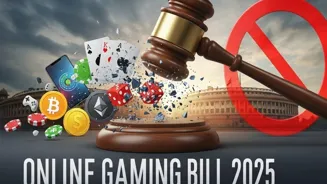The Lok Sabha has passed the Promotion and Regulation of Online Gaming Bill, 2025, to effect a blanket and hard-hitting crackdown on online real money-based games in India. The government said it aims
to curb addiction, money laundering, and financial fraud through such games in the country.
The bill still needs to be passed by the Rajya Sabha, but if it goes as smoothly as in the lower house — via a voice note as the opposition protested on another subject — there could be wide-ranging impacts on individuals and organisations involved in the gaming ecosystem.
Before we discuss the punishments mentioned in the draft, it needs to be noted that amid this whip on the online gaming platforms, the centre said it’s trying to promote and develop e-sports in the country, which should protect non-gambling games. An authority is being set up to oversee e-sports, educational games, social games, and real money gaming, and all organisations will fall under its regulations.
The bill outlaws all online betting and gambling activities — from online fantasy sports like Dream11 and My11Circle to online gambling like Poker, Rummy and other Card games and online lotteries, irrespective of whether they are considered ‘skill’ or luck-based.
Punishments for Platforms & Individuals under the Promotion and Regulation of Online Gaming Bill, 2025
Running/Offering Online Money Games
The draft states in no uncertain terms that, “No person shall offer, aid, abet, induce or otherwise indulge or engage in the offering of online money game and online money gaming service.”
Hence, anyone offering or running online real money games will face the following punishments:
- Jail: Up to 3 years
- Fine: ₹1 crore
Promoting/Endorsing such Platforms
The bill also hits hard on influencers and celebrities, banning them from promoting such games. In the past few years, several national cricketers, coaches, and even board members have been seen featuring in television ads. If this bill is passed, doing so after that will bring punishments of:
- Jail: Up to 2 years
- Fine: ₹50 lakh
Moreover, financial institutions like banks are also prohibited from offering services as simple as processing transactions on such platforms. Under the bill, authorised officials have been given the power to search and arrest without a warrant if someone is ‘reasonably’ suspected of committing offences under this Act.
This applies to any place, including:
- physical premises/buildings,
- vehicles,
- computer resources,
- virtual digital spaces,
- electronic records/devices (with authority to override security codes).














